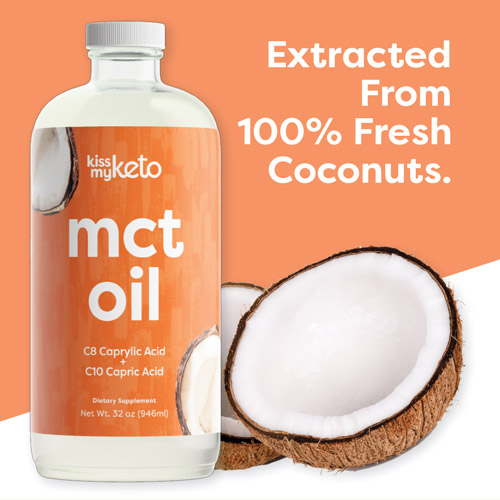In 2015, Zach Bitter broke the U.S. 100-mile record by maintaining a seven-minute mile pace for 11 hours, 40 minutes, and 55 seconds at the Desert Solstice Invitational. And the most surprising part about this story is that he ran those 100 miles on no carbs and loads of fat.
Zach Bitter is obviously living proof that an elite athlete can reach their peak performance fueled exclusively on fat by following a ketogenic diet. But how exactly is this possible, and should you consider this approach too?
We believe that a ketogenic diet can help you achieve your maximum when followed correctly. This diet taps into an almost unlimited fuel reservoir — essentially every runner’s dream. Don’t believe us? Take a look at our overview of the research and expert opinion on utilizing the power of fat for marathons.
Importance of Diet for Runners
Great exercise performance starts with great nutrition.
What you eat can make or break your workouts and affect how you feel. That’s why runners rely on the easiest and quickest fuel there is – carbs. In fact, up to 65% of your average runner’s diet is composed of carbohydrates.
This carb-centered approach is based on recommendations from sports nutrition authorities like the International Society of Sports Nutrition (ISSN) that propose:
- Daily carbohydrate intake from 5-12g per kg of body weight.
- Carb intake that varies depending on workout amount and intensity.
- When training at moderate to high intensity (more than 70% of VO2max) for 12 hours a week, a carb intake of 8-10g/kg daily 1.

Eating this way improves glycogen stores in the liver and muscle. And while this approach works for most, will loading on carbs really help you achieve your very BEST, especially if you’re an ultrarunner? Maybe. But there are more promising options that people are not talking about like the keto diet, for example.
The problem with carbs and glucose is that your body can only store so much. At any given point, there are only 600g of glycogen in your body 2. In theory, this amount should help you run for 90-120 minutes or for 26 miles. When all that glycogen gets depleted, your body starts to use fat for the remainder of your run 3.
However, your body doesn’t just switch to another fuel just like that. It first signals your cells to slow down, it breaks down muscle fibers, and metabolites start to build up leading to decreased muscle force. Even if you’ve worked hard to increase your lactate threshold, it’s only a matter of time before you start bonking.
Is the Keto Diet Right for Runners?
According to Dr. Stephen Phinney, a medical researcher who specializes in low-carb nutrition, a low-carb diet like keto diet is perfect for runners 4.
Dr. Phinney – who co-authored “The Art and Science of Low Carbohydrate Living” with colleague, Jeff Volek – spent decades studying the effects of low-carb diets on endurance athletes. He believes that the body could sustain high-intensity workouts for longer by using stored fat.
His theories are supported by research showing that glycogen stores are insufficient to fuel a marathon 5, 3, but also research examining the benefits of low-carb, high-fat (LCHF) diets on exercise performance 6.
These studies found that LCHF diets maintain, and even enhance, endurance performance while at the same time improving body composition. This is contrary to what we’re used to hearing in regards to sports nutrition.
Carbs are, and will be, considered the mainstay because they burn faster than fat; it takes much more time and effort for the body to burn fat, which is why some consider it an inefficient fuel. But things take a major turn when you eat a ketogenic diet specifically for a longer period of time.
Keto for Runners – How It Works
Sport nutritionists have long advocated for high-carbohydrate diets because such diets help stock up on muscle glycogen for better workouts. This was supported by short-term (less than 2 weeks) studies comparing high-carb and low-carb diets in regard to exercise performance.

There is some truth to this. Without being adapted to a LCHF or keto diet, you will deplete your muscle glycogen and end up with hypoglycemia, fatigue, impaired performance, and muscle wasting 7. The secret to making a keto diet work when you’re a runner lies in something called “fat-adaptation.”
What Exactly Is Fat-Adaptation?
Fat-adaptation is metabolic switch that happens after following a keto diet for a period of time. When you’re fat-adapted, your body is better able to utilize fat for fuel, relying less on glycogen.
Endurance athletes who became fat-adapted after following keto for 9-36 months could reach the maximal fat oxidation rate of approximately 1.5 g/min at about 70% VO2max 8. That’s much higher than ever reported on carbohydrate-adapted endurance athletes.
Besides that, ultra-endurance athletes who followed a LFHC diet for 6 months achieved higher peak exercise intensity than athletes on high-carb diets 8. These athletes also maintained normal muscle glycogen throughout, which is important for post-workout recovery.
So, bottom line is that long-term ketogenic diet improves an athlete’s fat-adaptation, i.e. the ability to utilize fat during vigorous activity. Keep in mind that one aspect of fat adaptation involves greater ketone production to fuel the brain specifically. You can read more about what it means to be keto adapted here.
Going Keto for Runners – Rules to Live By
If you’re seriously considering keto to help you get fueled by fat for your next marathon, then there a couple of rules you need to stick to. Following these rules will help you reach your peak performance, improve your body composition, and help you feel great along the way.

1. Start during your off-session
Because it takes time to become fat-adapted, it’s best to start a low-carb diet during your time off. When first switching to a keto diet, almost everyone experiences something called keto flu. It’s caused by drops in blood glucose and, sometimes, electrolyte imbalances due to the diet’s strong diuretic effects. Expect this “flu” to last a week or so when you first go low carb.
2. Eat enough protein
Eat between 1.3 to 2.5 g/kg of body weight of protein daily to maintain muscle mass, gluconeogenesis, and fat oxidation. The standard keto diet is based on eating moderate amounts of protein (1g/kg of body weight). However, endurance athletes will need more than that, especially when training for a marathon.
3. Use MCT supplements

Coconut and palm kernel oils are natural sources of medium-chain triglycerides (MCTs). However, a more reliable and concentrated source of these beneficial fats are MCT oil, capsules, and powders. These are supplements containing a special type of fat that your body digest and uses even more quickly than carbs. Studies also show that MCTs boost ketone production within minutes 9.
4. Try carb loading
If you haven’t managed to follow a keto diet for long enough to become fat-adapted, try a cyclical approach. The cyclical ketogenic diet involves 5-6 days of high-fat eating followed by 1-2 days of carb loading to enhance both muscle glycogen and fat-adaptation. One systematic review notes that this approach results in a higher fat oxidation rate of 0.7 to 0.8 g/min and a lower carbohydrate oxidation rate of 2 to 2.3 g/min 10.
Besides all of the above, you should also make sure to stay well-hydrated, take electrolytes, and may even consider exogenous ketones to boost your performance. It may take time and dedication before you’re able to realize your full potential with a keto diet, but it just may be the push you needed.
Conclusion
Marathon runners know the importance of nutrition in reaching one’s full potential. But decades of nutritional advice based on carb loading have made runners wary of any other alternative. Carbs will remain the primary energy source for marathoners, and most won’t even look into keto as an alternative.
However, when you really think about it, runners following a ketogenic approach are not really doing anything out of the ordinary. All runners eventually end up running on fat – keto runners are just utilizing that fat differently. In short, keto makes utilizing fat easier and quicker for marathoners.
If you too are considering a ketogenic diet for your workouts and marathons, make sure to plan well ahead. It takes time for your body to adapt to keto. And besides that, any major change to your diet and lifestyle will be stressors for your body – so do give it time before your next big run.










![Juicing for Weight Loss: Everything You Need to Know [Plus Recipes]](/wp-content/uploads/2019/08/Juicing-for-Weight-featured-image.jpg)








